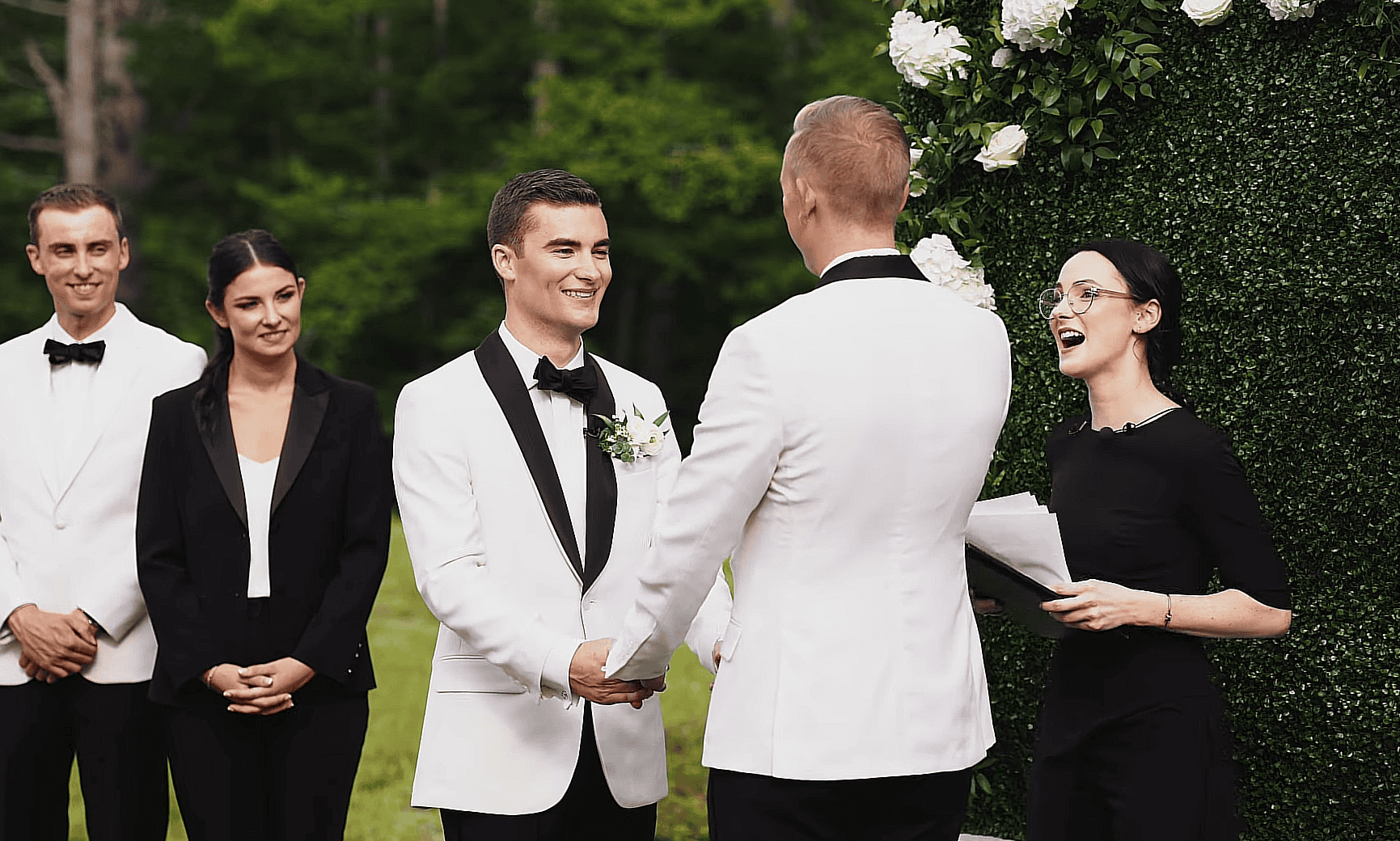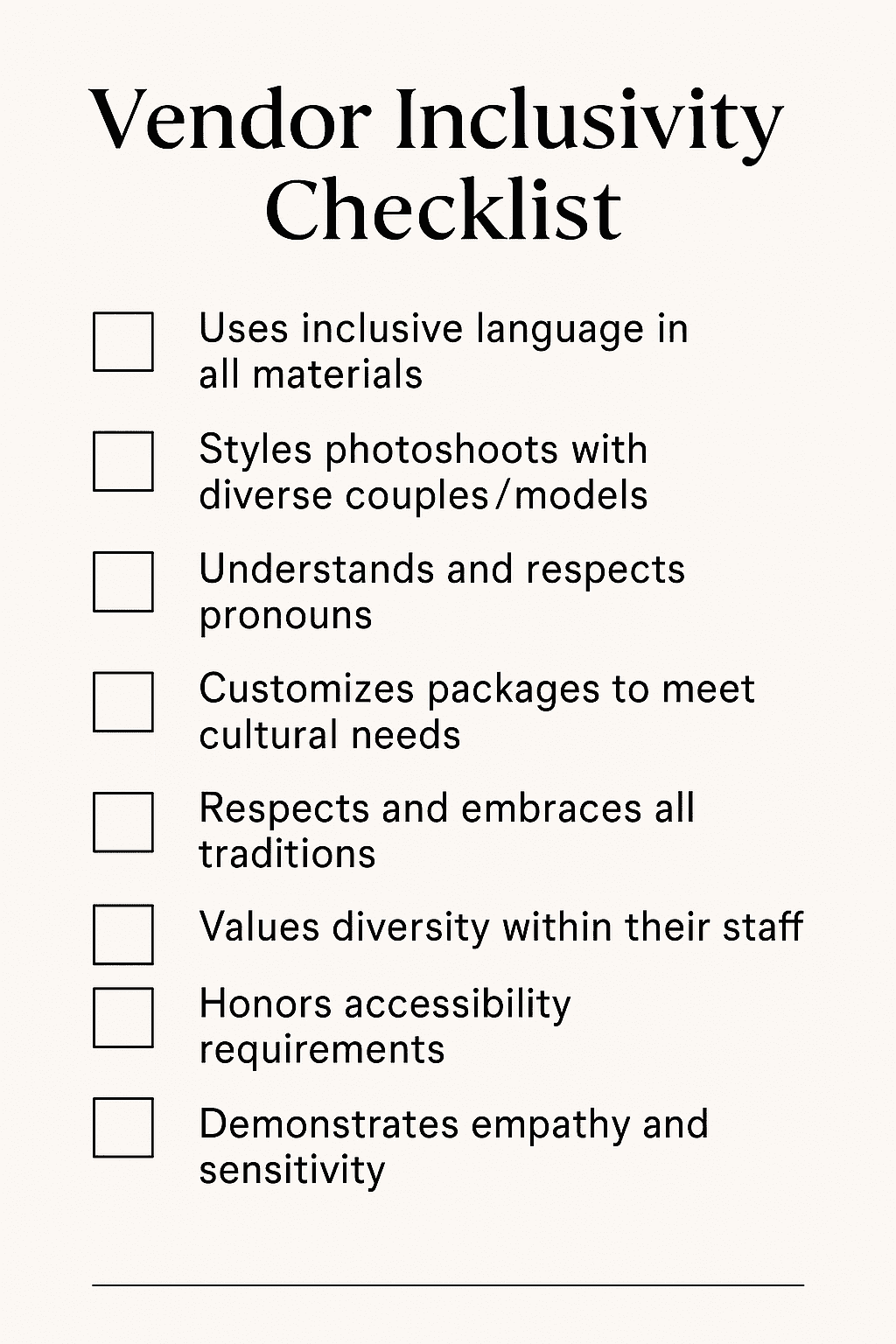It’s 2025, and weddings are no longer bound by tradition. Or at least, they’re not supposed to be. From nonbinary marriers to multi-faith unions, from wheelchair-accessible dance floors to bilingual ceremonies, today’s weddings reflect a spectrum of love stories.
But while couples are showing up with radically beautiful, inclusive visions—many vendors are still playing catch-up.
SweetSundayEvents.comWhat “Inclusive” Means Now
Gone are the days when “inclusive” only meant adding a vegetarian option to the menu. This is about representation. About seeing your culture, your identity, your family makeup—your reality—reflected in a celebration that’s meant to be yours.
Inclusivity now includes honoring same-sex and queer couples without hesitation, offering non-gendered language in contracts, being sensitive to neurodivergence and mental health, planning for accessibility needs, respecting different body sizes in sample attire, and yes, even knowing how to navigate cultural nuances without turning someone’s heritage into a theme.
That sounds like a lot. Because it is. And couples are taking notes.
The Demand Is Loud and Clear
A report from Zola’s First Look 2025 found that over 45% of couples identified “inclusivity” as one of their top three values while planning their weddings.
Nearly half said they were actively seeking vendors with shared cultural or identity alignment—or, at the very least, vendors who had experience working with diverse couples and didn’t need “training” to be respectful.
Same-sex weddings continue to rise in number, yet some couples still face awkward moments. “Vendors kept asking me who the bride was,” one groom noted on a wedding forum. “There are two grooms, and it’s 2025. We shouldn’t have to keep correcting people.”
Others share stories of being the only Black couple a vendor had ever worked with—or being asked if their fusion ceremony would be “confusing” for guests.
The demand for more inclusive service is not a niche concern. It’s the norm. And those who don’t keep up? They’re being left behind.
Vendor Inclusion Checklist (Or Lack Thereof)
Couples are scanning for red flags in vendor behavior long before the cake tasting. Websites still using only straight, white, thin couples in their portfolios? Probably not getting the booking.
Contracts that refer only to “bride and groom”? Time to edit or delete. Sample sizes that don’t go past a 10 or 12? That’s a hard pass for a lot of brides.
Some vendors are rising to the moment. They’ve swapped out gendered forms, added inclusive language on their websites, and trained their staff in cultural and LGBTQ+ competency.
Others are holding tight to tradition or saying things like “we treat everyone the same” without understanding that equality and equity aren’t the same thing.
Inclusive vendors aren’t just checking boxes—they’re doing the real work. That means asking, not assuming. Listening, not reacting. And adapting their business to fit the couple, not the other way around.
Download our handy vendor inclusivity checklist
SweetSundayEvents.comWhat Couples Actually Want (And Aren’t Getting)
Most couples aren’t asking for miracles. They want to feel safe, seen, and celebrated. They want wedding pros who won’t blink when two brides walk in or when a marrier introduces themselves with they/them pronouns.
They want planners who know how to coordinate interfaith ceremonies without making one side feel like a prop. They want vendors who can find tuxes in a 4X or makeup artists who know how to work with textured hair and deeper skin tones.
This is the baseline, not the bonus. The fact that some couples still have to educate their vendors mid-process is exhausting. And it’s why inclusive directories like Equally Wed’s Vendor Directory and platforms like Love Stories TV are booming—people want to know upfront who’s already doing the work.
Accessibility Still Needs a Spotlight
Disability inclusion is still lagging behind. Ramps, accessible seating, ASL interpreters, clear communication for neurodivergent guests—these shouldn’t be rare. But they are. In a 2024 survey by wedding accessibility advocate Bridely Disabled, over 65% of respondents with physical disabilities said they encountered venues or vendors that “did not meet even basic accessibility standards.”
That means stairs without railings, chairs that don’t accommodate wider bodies, dressing rooms that aren’t wheelchair friendly, and websites that don’t offer alt text or screen-reader compatibility. It’s not just about the couple either—guests need consideration, too.
Weddings are meant to include everyone. If Grandma can’t reach the ceremony site or your best friend can’t get into the photobooth, something’s broken.
The “Woke” Pushback (and Why It’s Nonsense)
There’s a lingering myth that inclusive weddings are somehow political—or that making space for all love stories dilutes tradition. That’s not only wrong, it’s outdated. Inclusivity doesn’t take anything away from anyone. It simply expands the table. A Jewish-Hindu wedding with pronoun pins and a drag queen officiant might not be your grandmother’s wedding—but it’s someone’s dream, and that matters.
Weddings have always evolved with culture. From hoop skirts to hot pink jumpsuits, from arranged marriages to Tinder meets, the institution of marriage isn’t stuck in time. Neither should the vendors be.
What the Industry Can Do (Now, Please)
It’s not rocket science. Vendors can:
- Update their language and forms to remove assumptions.
- Hire staff who reflect the communities they serve.
- Show diversity on their social feeds without tokenizing.
- Make spaces (physical and digital) accessible to everyone.
- Offer sizing, styling, or services that suit a wide range of clients.
- Listen to feedback and continue learning—especially from couples themselves.
There’s no downside to doing better. In fact, the upside is massive. Inclusive vendors aren’t just nice to have—they’re becoming the default. And they’re the ones getting referred, recommended, and rebooked.
Celebrating Love Without Exceptions
Weddings have always been about declaring love—and love, at its core, should never require footnotes. The rise of inclusive weddings isn’t a trend. It’s a movement. And if the industry can catch up, the result will be a celebration space that’s richer, more vibrant, and genuinely joyful for everyone involved.
So whether you’re planning a barefoot beach elopement with your best friend-turned-spouse, or a 200-person multicultural fusion bash—your love story deserves a team that shows up for you, no questions asked.
And vendors? If you’re not already on board, now’s the time. The future of weddings is here—and it includes everyone.




